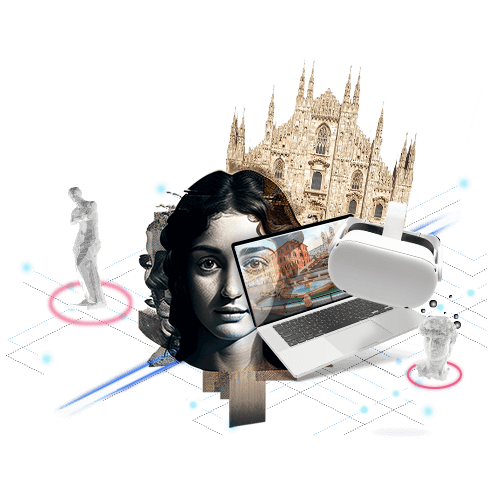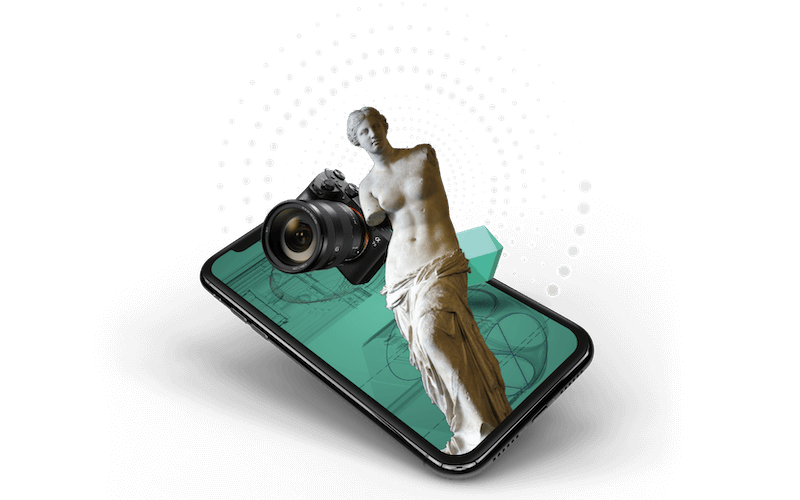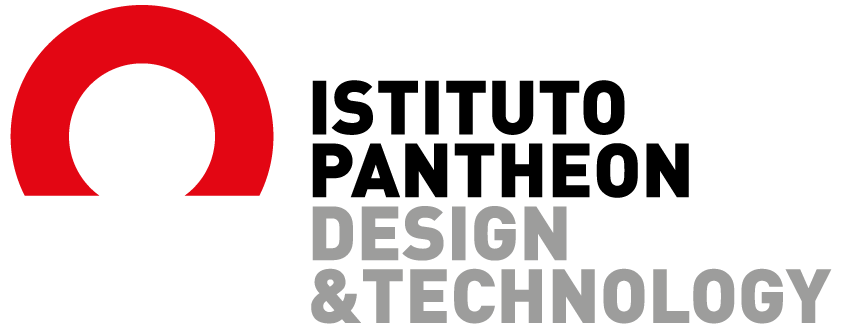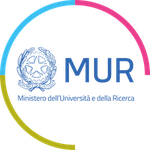Communication and Enhancement of the Contemporary Artistic Heritage
Design of Culture and Tourism
HISTORY - ART - ARCHITECTURE
Get to know and learn how to enhance the cultural heritage and tourist experiences of our territory, become a designer of culture and tourism

DESCRIPTION
The First Level Academic Diploma in Communication and Assessment of Contemporary Artistic Heritage aims to train professionals in the field of cultural heritage, with specific skills related to the management, promotion and enhancement of the artistic heritage, with particular attention to the contemporary one. This figure is able to recognize cultural assets and what they are based on, knows how to manage them in a specific context and knows how to communicate to enhance them.
At the cultural basis of this knowledge there is a consolidated knowledge of the history of contemporary art and architecture. At the same time, this professional figure will able to master English autonomously and fluently, particularly in the field of artistic communication.
Furthermore, there will be a chance for students to take part in an internship experience from the first year of the three-year course, as well as intensive workshops carried out at the end of each academic year with the aim of building mini-projects that will allow students to put into practice the knowledge acquired during the year.
ACADEMIC DIPLOMA PROFILE

SKILLS
- Office Suite
- Adobe Illustrator
- Adobe InDesign
- Adobe Photoshop
- Adobe Premiere
- Adobe Audition
- Unity
- Adobe After Effects
- Rhinoceros
- Asana
- Concept Board
- Blender
- Davinci Resolve
PROFESSIONAL FIGURES
- Culture and Tourism Designer
- Museum curator
- Creative director
- Travel Designer
- Project Manager / Project Coordinator
- Event organizer
- Expert in Communication and Marketing of Cultural Heritage
SCHOLARSHIPS AND RECRUITING





Take a look at our Youtube channel, you will find all the interviews with directors and managers of these companies.
COURSE PROGRAM
PROGRAM
1st YEAR
Theory and practice of perspective drawing
The course aims to make students aware of the importance of drawing in the dynamics of communication: a type of expression that is capable of recounting contemporary heritage and tracing new tourist itineraries. The educational path will reach the fundamental elements of geometry, the analysis of spaces and architecture, focusing on perspective as a method for representing the depth of space.
Aesthetics of visual arts
The course aims to introduce the ways in which the concept of “Aesthetics” is articulated in disciplines such as history of art, favoring its theoretical aspects focused on the problem of knowledge of internal and external realities, through the relationship between analytic and imaginary reason, in a condition of continuous exchange. The educational path intends to address issues that are still current and new, investigating the relationship with cultural heritage and with the trajectories of tourism in order to plan the experience.
History of contemporary art
The course aims at acquiring the ability to read the artistic heritage, recognizing styles and technical and aesthetic differences. It aims to make student understand the links between different technologies and the influences of political and socio-economic systems in the development of cultural and artistic expressions that influence current tourist itineraries. The educational path will focus on the knowledge of 20th and 21st century works and artists, on the stylistic and theoretical evolution that has characterized Western artistic research up to the most recent contemporary proposals, moving between the profound transformations that have taken place on the concept of work of art, and on the speed of change of the artistic language. A workshop period will be included to help students work on audience development and cultural mediation approaches with respect to works of art and museums.
Anthropology of art
The course deals with the relationships between content, image and narrative process adopted by the different artistic types. Through combinations and with an interdisciplinary vision, we will explore projects and works that have references to evident anthropological characteristics, especially regarding the relationship between human being and heritage. The educational path intends to develop a psychographic analysis of the target audience, using the methodologies developed by current anthropology.
Design Methodology of Visual Communication
The course aims to develop a design methodology applicable to any creative process, in particular to visual communication for cultural heritage. The acquisition of this understanding and the development of critical tools, with respect to the perception of our surroundings, allow to manage design and creative production by combining observation and method. The educational path aims to promote the design process and technical knowledge by soliciting a dialogue between the different disciplines, and will be aimed at designing the visual identity of a cultural institution.
Theory and history of cultural heritage
The course aims to promote knowledge of cultural heritage from its material and immaterial conception. The meaning behind the heritage will be investigated, deepening the processes of evaluation, protection and enhancement of the assets, from a cultural and touristic point of view. The goal is to make people aware of the value of the cultural asset also from a social and economic point of view, investigating the evolution of the concept over the years.
Multimedia languages
The course aims to analyze multimedia languages and techniques, deepening their application aimed at creating a multimedia product. Through the study of media tools, we can promote and consolidate the languages applied to visual communication for heritage, such as web design, digital communication and augmented reality for cultural heritage. The educational path aims to stimulate the ability to read the dynamics of technological innovation and the dissemination of multimedia through a parallel mutation of artistic and social-cultural sensitivity.
Fundamentals of Computer Science
The course aims to develop digital skills capable of responding adequately to the needs of the job market. We will study how “computer science” has shaped the panorama cultural heritage and how it influences tourism dynamics. The educational path will be divided between terminology, application tools and experiments.
English
. The course aims to increase the understanding and production skills of the English language to reach an intermediate level – B1 according to the Common European Framework of Reference for Languages (CEFR). The study of English will be especially directed to be used the field of contemporary artistic heritage.
PROGRAMMA
2° ANNO
Digital photography
The course highlights the importance of photographic language as a tool for communication, expression and research both on a theoretical and a practical level. It provides the necessary teachings in order to develop and understand the importance of composition, to know the techniques of indoor and outdoor shooting, the treatment of sensitive material both in analogue and digital, the technology of the camera, the choice of equipment, the ‘exposure and measurement of light, the language of optics, landscape photography and professional studio photography, developing a specific knowledge of the photographic language.
History of contemporary architecture
The course intends to reflect on the forms and contents (also symbolic) of contemporary architectural languages. We can read architecture in close relationship with other cultural manifestations and with social-economic phenomenon. The educational path aims to provide in-depth knowledge of the changes that have taken place in the concept of architectural space since the beginning of the nineteenth century, passing from the architectural avant-gardes up to the most recent trends of recent decades; a workshop will be carried out to apply enhancement methods for buildings and contexts of interest.
Information and digital communication law
The course aims to analyze the issues of information and digital communication in the framework of Italian, European and international law. It will pay particular attention to issues related to the enhancement of cultural heritage in the various forms provided by state and regional legislation. The educational path will analyze various issues (such as access to places of culture; the use and reproduction of cultural heritage; the dissemination of heritage; assistance and hospitality services), also with the goal of promoting and supporting tourism development.
History and documentation of architectural heritage
The course aims to provide basic knowledge on history and documentation methods with respect to architectural heritage, especially of modern and contemporary period. Through a historical-critical analysis of works and authors with respect to the chronological period, urban contexts and clients, we can provide the tools to classify and enhance heritage. The educational path will deepen the transformation of the relationship between design and historical events, architecture and technology, urban environment and landscape, starting from the general framework to get to theoretical problems and design perspectives.
Enhancement of architectural and landscape assets
The course focuses on the necessity to protect and consequently promote cultural heritage, not only as a historical testimony, but also as rooted elements of local identity. The intention is to approach heritage from its material and immaterial value, as part of a system of local resources and services, which involves the communities and the various stakeholders in a virtuous process of conservation and enhancement. The educational path will examine approaches and tools for a positive enhancement of architectural and landscape assets from a touristic, economic and social point of view, developing a design and use project that renews the image of an architectural asset, enhancing its characteristics and repositioning it in the touristic dynamics.
Contemporary Museology
The course aims to discuss aspects of museology which are related to the history of the museum and collections by analyzing contemporary museology as a complex discipline capable of relating legislation and heritage management, communication, media and museum education. The course also aims to examine the main contemporary museums, by exploring the characteristics of discontinuity with respect to the past. It will also take advantage of the new perspectives related to cultural production, experience, participation and inclusiveness of the museum institution, in a broader overview of sustainable tourism.
Staging design
The course intends to approach contemporary exhibit design and design methodologies for setting up different kinds of events. By means of the theoretical study of techniques and case studies, and through a workshop dimension, we intend to analyze and process the set-up from a critical, creative and design point of view. The educational path aims to stimulate the search for a balance between individual objects and context, developing a project that can allow a new reading of both these elements in museum, event and urban regeneration contexts.
Fundamentals of cultural marketing
The course aims to provide specific knowledge in communication and cultural / experiential marketing, in the enhancement of heritage, as a social and economic resource for the area, by planning promotional campaigns. The course will address the evolution of marketing through the study of tools and strategies, with particular reference to culture and tourism, and will focus on Audience Development, which is related to cultural organizations, to know how to reach, increase and diversify the public.
Fundamentals of cultural marketing
The course aims to provide specific knowledge in communication and cultural / experiential marketing, in the enhancement of heritage, as a social and economic resource for the area, by planning promotional campaigns. The course will address the evolution of marketing through the study of tools and strategies, with particular reference to culture and tourism, and will focus on Audience Development, which is related to cultural organizations, to know how to reach, increase and diversify the public.
PROGRAM
3rd YEAR
Elements of architecture and city planning
The course aims to deepen the knowledge of the significant elements of architecture and to give fundamental knowledge about city planning. The lessons will focus on Architecture as a language that traces the possibility of using space, and of City planning as a matrix of cities and their dynamics. The course will focus on the cultural value of the architectural space in the social and environmental context and on the in-depth study of specific historical periods that have characterized the history of architecture and city planning.
Style, history of art and of costume
The course aims to acquire the ability to read works of art, to recognize the various styles and their aesthetic and technical differences. Through analysis and comparisons we can understand the links between different technologies and the influences of political and socio-economic systems in the development of cultural and artistic expressions. The educational path will develop from the Neo-avant-gardes to the concepts and protagonists of the latest trends in contemporary art, from the Informal to the Neo-object.
Net art
The course aims to share the theoretical principles of Net Art and the interdisciplinary intersections connected to it, as well as the objectives of the main practices, the subjects that they carry out and in which places they are carried out, in order to define a new possible horizon for the work of art. The educational path aims to analyze one of the main development paths of art by means of new communication technologies. During the lessons, students will explore the tools and languages of Augmented Reality and new trends in contemporary art and its using.
Cultural heritage of the contemporary age
The course aims to stimulate a broad reflection on contemporary heritage, understanding its material aspects but also in its intangible characteristics. Starting from legislative references and case studies, students will analyze the conceptual aspects and the aesthetic-philosophical substratum, while also looking at contemporary reflections on non-places, on the third landscape, by examining specific cases that concern the relationship between assets, territory, and the role of the arts.
Communication and enhancement of museum collections
The course will examine theoretical and practical aspects of museum communication in relation to new means of communication, in order to promote and enhance the collections and archives of cultural realities. The educational path will touch on various case studies, understood as museological paradigms, in Italy and in Europe, and will promote visits in institutional or informal locations to closely analyze the techniques and tools used to enhance the collections.
English for artistic communication
The course teaches the use of the English language for artistic communication and promotes a fluent use of the tourist language. Students will analyze the rhetorical structures of cultural heritage and tourism communication, by deepening tools such as texts of critique, advertising, digital copy and editorial language. The course will include various exercises and moments of discussion in the form of reading workshops, which discuss the key issues in the field of art and tourism.
Mass media theory and method
The course aims to introduce the most important models of communication, the history and theories of the media and the main research paradigms on the influence of mass media in society. We will deepen the use of communication, especially digital, in “making community”. The educational path aims to understand and master the knowledge related to the birth and evolution of mass media applied to multimedia.
Methodologies and techniques of the contemporary
The course aims to promote an interdisciplinary approach to contemporary languages, analyzing the close relationship between theoretical, political, poetic and artistic practices. Students will study the expressions that intertwine different fields of research using a plurality of methods and technologies. It will analyze the different procedures of the new cultural operators, aiming to make students understand the process of design and artistic production.
Digital applications for art
The course aims to address the different application aspects of the digital field in artistic practice through theoretical notions, practical analysis, and the study and use of digital applications within the artistic world. The course will lead to the creation of projects aimed at print, video and web, from cinema to multimedia, professional photo editing, graphic design and a correct and balanced work setting.
First Level Academic Diploma authorized by MUR (Ministry of Education, University and Research)
with Ministerial Decree prot. No. 626 of 18 July 2013.
FILL OUT THE FORM
to receive more information.
We will contact you within a few hours.


